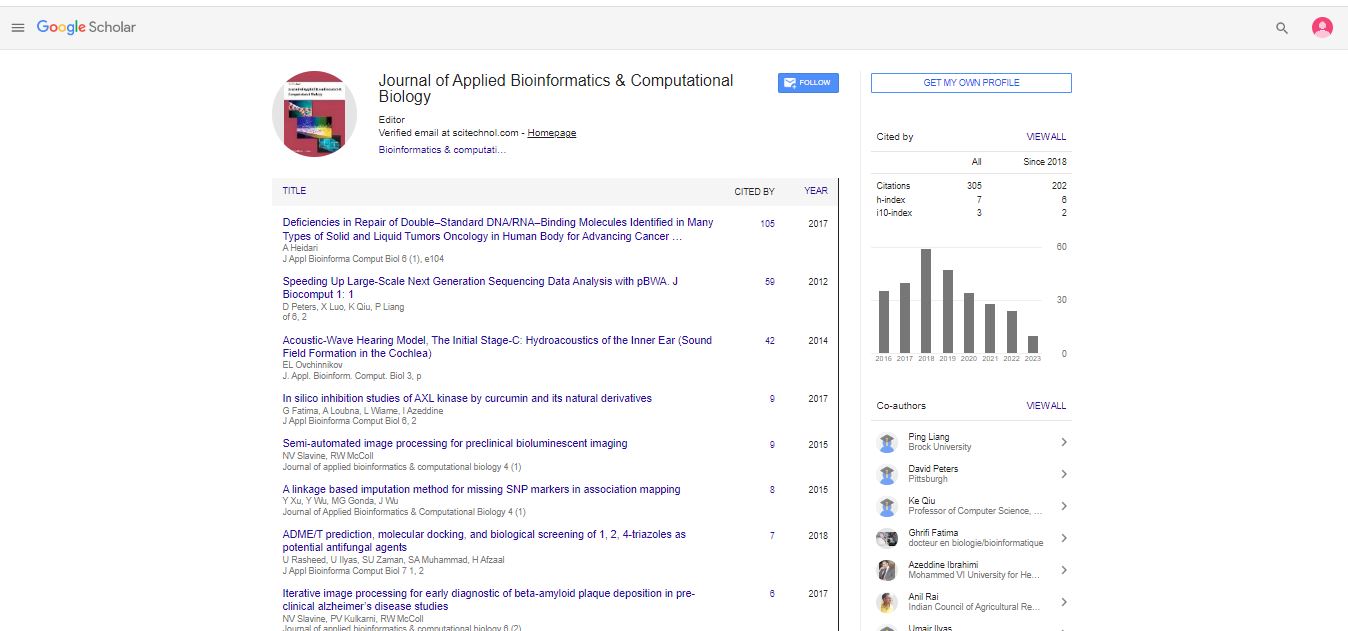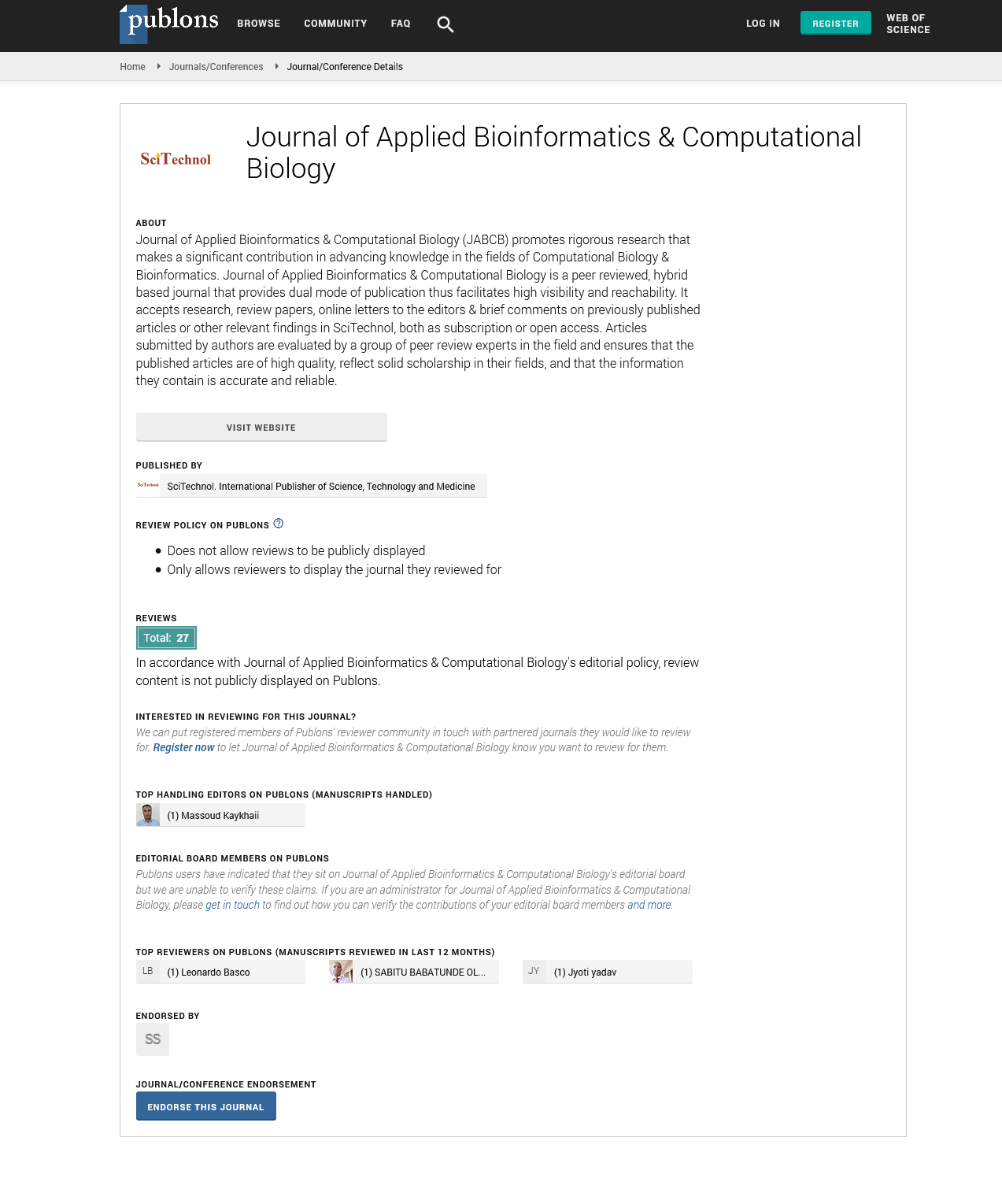Commentary, J Appl Bioinformat Computat Biol S Vol: 0 Issue: 0
Rapid Screening of Drugs as Antimicrobials and Integrated Approach for Repurposing of Untapped Drug Targets against Drug Resistance
Bhargav Chand*
Department of Forestry and Biodiversity, Tripura University, Suryamaninagar, Agartala, India
*Corresponding Author:Bhargav Chand
Department of Pathology
Icahn School of Medicine at Mount Sinai
New York, NY, USA
E-mail: chandbargav@mountsinai.org
Received: October 04, 2021 Accepted: October 18, 2021 Published: October 25, 2021
Citation: Chand B (2021) Rapid Screening of Drugs as Antimicrobials and Integrated Approach for Repurposing of Untapped Drug Targets against Drug Resistance. J Appl Bioinforma Comput Biol S4.
Abstract
Keywords: Drug Targets, Drug Resistance
Introduction
Drug repurposing offers an assisted and prudent course to foster new clinical therapeutics in contrast with customary medication advancement. Development based high-throughput screening is associative with drug repurposing and empowers fast recognizable proof of new restorative uses for examined drugs; in any case, this customary technique isn’t viable with microorganisms with unusual development examples, for example, Staphylococcus aureus little state variations (SCV). SCV subpopulations are auxotrophic for key builds in biosynthetic pathways, which bring about low development rate. SCV arrangement is likewise connected with decreased antitoxin helplessness, and the SCV’s capacity to return to the ordinary cell development state is thought to add to repeat of S. aureus contaminations. Traditional anti-toxins neglect to effectively treat constant osteomyelitis, endocarditis, and gadget related and aviation route diseases. These common contaminations are related with the rise of SCV, which are obstinate to traditional anti-infection agents. Studies have researched anti-infection treatments to treat SCVrelated contaminations yet have had little achievement, stressing the need to recognize novel antimicrobial medications. Notwithstanding, drug revelation is an expensive and tedious interaction. An elective methodology is drug repurposing, which could recognize FDAendorsed and very much described medications that could have offname utility in treating SCV [1].
In spite of the different methodologies embraced in the clinical practice, the death rate because of anti-microbial safe organisms has been particularly expanding around the world. Notwithstanding multidrug-safe (MDR) organisms, the “ESKAPE” microorganisms are additionally arising. Obviously, the contamination brought about by ESKAPE can’t be dealt with even with deadly portions of anti-microbials. Presently, the medication opposition is likewise more common in antiviral, anticancer, antimalarial and antifungal chemotherapies. The expression “drug opposition,” all the more normally alluded to meds like anti-microbials, is currently reached out to anticancer specialists. The medication safe irresistible sicknesses, including multidrug-safe (MDR)/broadly drug-safe (XDR)- tuberculosis, disease because of methicillin-safe Staphylococcus aureus (MRSA), vancomycin-safe Staphylococcus aureus (VRSA), carbapenem-safe Enterobacteriaceae (CRE), drug-safe Clostridium difficile and drug-safe malignancy are the most hazardous medical problems, which need focused on center in research [2,3]. As of late, notwithstanding multidrug-safe (MDR) microbes, “ESKAPE” (Enterococcus faecium, Staphylococcus aureus, Klebsiella pneumoniae, Acinetobacter baumannii, Pseudomonas aeruginosa and Enterobacter species) microscopic organisms has likewise arisen which can withstand deadly dosages, everything being equal. The World Health Organization (WHO) anticipated that antimicrobial opposition (AMR) is relied upon to cause 10 million passings every year by 2050 [4].
Diseases with multidrug-safe (MDR) creatures have arisen as a critical overall general wellbeing emergency, with 2,000,000 contaminations and an expected 23 000 passings in the United States every year [5]. The occurrence is expanding somewhat because of the particular strain from inescapable utilization of anti-infection agents in the two people and creatures. Current treatment of bacterial diseases ordinarily requires wide range anti-microbials until a microorganism can be disengaged, distinguished and antimicrobial defenselessness testing performed, which can require a couple of days.
The normally utilized helplessness testing for clinical diagnostics incorporate stock microdilution, agar weakening, fast computerized instrument strategies, plate dissemination and inclination dispersion techniques. These techniques are normally reasonable for testing up to ~25 anti-toxins for a given example. There is restricted capacity for testing drug mixes, in spite of the fact that blend treatment is utilized regularly to treat extreme contaminations. Subsequently, an improvement of the current antimicrobial helplessness testing strategies is expected to address the difficulty of treatment of contaminations brought about by MDR microscopic organisms (MDRB). New powerlessness testing procedures are presently being investigated to address this worry [6].
Colchicine, a notable calming drug utilized in the treatment of gout and pericarditis, is right now under clinical preliminary for treating COVID-19 patients. This medication has been ended up being successful in forestalling monstrous cytokine storm actuated pneumonia brought about by SARS-CoV-2 (extreme intense respiratory disorder Covid 2). The antiviral impact of a more seasoned antimalarial drug, chloroquine (utilized as phosphate salt) against SARS-CoV-2 disease has likewise been examined around the world. Studies propose that chloroquine might be valuable in forestalling Covid prompted pneumonia in COVID-19. According to ongoing reports from NIH (National Institutes of Health, US), the clinical preliminary of a mix of hydroxychloroquine/azithromycin for the treatment of COVID-19 patients has as of now been begun. In this blend, both the medications are FDA endorsed, where hydroxychloroquine is an antimalarial medication and azithromycin is an antibacterial anti-infection. An enemy of viral medication, favipiravir planned for the treatment of flu is right now under stage 2/stage 3 clinical preliminaries on COVID-19 patients all throughout the planet (China, Japan, US, India). Glenmark has started stage 3 preliminary on favipiravir for the treatment of COVID-19 patients in India. An investigational hostile to retroviral drug called remdesivir (initially created by Gilead Sciences Inc. for the treatment of Ebola, yet fizzled in clinical preliminary) is additionally under clinical preliminary for treating COVOD-19 patients in a few nations like China, US, UK and India. In India, clinical preliminaries on favipiravir, remdesivir and colchicine are in progress by CSIR (Council of Scientific and Industrial Research) labs. A proper portion drug blend called lopinavir/ritonavir prior endorsed to treat HIV/ AIDS under the brand name Kaletra is presently being examined to treat COVID-19 patients in a few nations.
References
- DiMasi JA (2001) Risks in new drug development: approval success rates for investigational drugs. Clin Pharmacol Ther 69:297â??307
- Gerard D (2016) Antibiotic adjuvants: rescuing antibiotics from resistance. Trends Microbiol 24:862â??871
- David B (2015) Antibiotic resistance breakers: can repurposed drugs fill the antibiotic discovery void? Nat Rev Drug Discov 14:821â??832
- World Health Organization (WHO) (2019) New report calls for urgent action to avert antimicrobial resistance crisis, Geneva Available at https://www.who.int/news-room/detail/29-04-2019-new-report-calls-for-urgent-action-to-avert-antimicrobial-resistance-crisis.
- https://www.who.int/news-room/detail/29-04-2019-new-report-calls-for-urgent-action-to-avert-antimicrobial-resistance-crisis
- Poulikakos P, Tansarli GS, Falagas ME (2014) Combination antibiotic treatment versus monotherapy for multidrug-resistant, extensively drug-resistant, and pandrug-resistant Acinetobacter infections: a systematic review. Eur J Clin Microbiol Infect Dis 33: 1675â??1685
 Spanish
Spanish  Chinese
Chinese  Russian
Russian  German
German  French
French  Japanese
Japanese  Portuguese
Portuguese  Hindi
Hindi 
